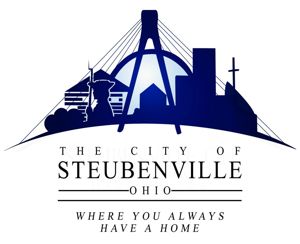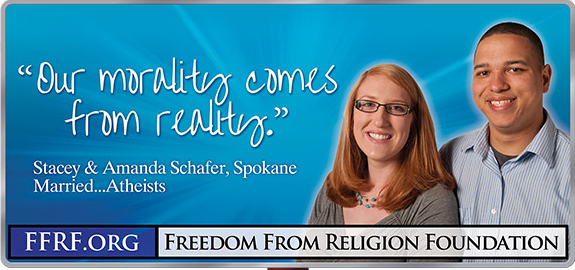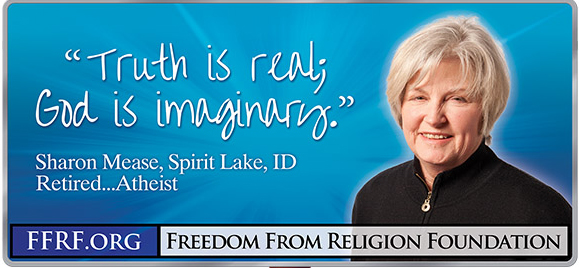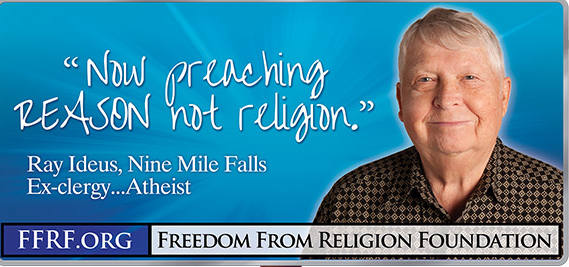Mobile Menu

Super User

Seven myth-dispelling billboards featuring Spokane-area nonbelievers and families are appearing this week for a month-long campaign, as part of an “Out of the Closet” project by the Freedom From Religion Foundation and its Spokane chapter, the Inland Northwest Freethought Society.
The billboards feature the friendly faces of local atheists, agnostics, and freethinkers along with their personal freethought “testimonials.”
Joshua and Chandra Alto, a family in Spokane, are featured with their children, incuding a baby, and the slogan: “Atheist family: Good without a god.”
Click on photos to enlarge.
Participants include nearby Idaho FFRF members who are active with the Spokane chapter, such as Harlan and Kay Hayes of Coeur d’Alene, who self identify as “great grandparents . . . nontheists.” The couple chose as their slogan: “Evidence and science trump myth — reason wins.”
“Truth is real; God is imaginary,” states Sharon Mease, from Spirit Lake, Idaho, who is retired and identifies as an atheist.
David Roeder, president of the chapter, appears with his statement, “On bended knee? Not for me.” Roeder calls himself an “inquisitive atheist.”
Stacey and Amanda Schafer of Spokane, a married couple who are atheists, share a board reading: “Our morality comes from reality.”
Former minister Ray Ideus, now an atheist living in Nine Mile Falls, says on his billboard: “Now preaching reason, not religion.”
“Freedom from religion lives,” proclaims Spokane salesman Frank Bender’s billboard.
The Freedom From Religion Foundation, a state/church watchdog based in Madison, Wis., is the nation’s largest association of atheists and agnostics with more than 18,500 members, including about 1,000 members in Washington. Spokane is FFRF’s seventh stop in its campaign to introduce its members and “friendly neighborhood atheists” to their neighbors. FFRF debuted the “Out of the Closet” campaign in Madison, Wis., in 2010, and has since it visited Columbus, Tulsa, Raleigh, Phoenix and Nashville (one billboard) with the unique campaign.
“The nonreligious are at least a quarter, 25% of the Washington adult population — claiming conservatively 1.2 million state citizens, yet there are many Americans who have never knowingly met an atheist or unbeliever, much less someone who is proud to advertise their nonbelief,” said Dan Barker, FFRF co-president. Barker, author of Godless, was formerly an evangelical minister who “just lost faith in faith.” He works with Ron Ideus on the new Clergy Project, a support group for clergy who have lost faith and are trying to leave the ministry.
“We are your neighbor, your classmate, your colleague, the person who opens the door for you at the grocery store, the parent you meet at the playground,” he said.
“Our members are FFRF’s greatest asset, our best advertisement for freethought,” adds Annie Laurie Gaylor, who co-directs FFRF. “It’s time to welcome atheists and agnostics into the American mainstream. Freethinkers are respectable and have much to offer our nation.”
FFRF warmly thanks the Inland Northwest Freethought Society chapter, director David Roeder for all the legwork, and participating individuals and families.
Because FFRF can’t put all of its members on a billboard, FFRF offers an interactive web application allowing any nonbeliever to place a “virtual billboard" at FFRF’s website.
If you are interested in helping to subsidize a billboard or coordinate a campaign in your area, please contact This email address is being protected from spambots. You need JavaScript enabled to view it..
Map/Addresses
Click on map to enlarge.
1. 1800 W. 3rd Avenue Spokane, WA 99201
2. 1217 N. Washington Street Spokane, WA 99201
3. 1708 W. Northwest Boulevard Spokane, WA 99205
4. 6010 N. Market Street Spokane, WA 99208
5. 8016 E. Trent Avenue Spokane, WA 99212
6. 7326 E. Sprague Avenue Spokane, WA 99212
7. 4105 N. Sullivan Road Spokane, WA 99216
FFRF victory: Cross removed from Steubenville logo


Left: This logo is being retired. Right: This older logo is the temporary replacement.
A complaint by the Freedom From Religion Foundation over inclusion of a chapel with a cross atop it on the new seal for Steubenville, Ohio, has resulted in a victory.
The city of Steubenville law director emailed FFRF this morning to report, “the city council has agreed to change the logo as per your request.” For now they are reverting to their previous city logo, until a new design is completed.
The disputed silhouette depicted the chapel of Franciscan University, which even Franciscan University spokesperson Tom Sofio told media is “instantly recognizable worldwide.” A different, nonreligious image of a different building from the University will be substituted.
FFRF Staff Attorney Patrick Elliott wrote Mayor Domenick Mucci on May 22, pointing out the city logo containing a Latin cross violates the Constitution. FFRF, with nearly 19,000 members nationwide, wrote on behalf of a Steubenville complainant. FFRF has members in Steubenville and nearly 500 in Ohio.
Elliott’s letter included a long list of federal court decisions consistently ruling it is unconstitutional for crosses and religious symbols to appear on municipal seals and logos:
“Any claims of historical or cultural significance to the Latin cross on the Steubenville City logo do not relieve the City of its constitutional obligations. The City of Steubenville must not endorse ‘faith’ and church. While we understand that Franciscan University is a part of the City, the City may not depict the University chapel and cross because to do so places the City’s imprimatur behind Christianity. This excludes nonChristians and violates the Constitution.”
“We’re pleased with the expeditious response,” said FFRF Co-President Annie Laurie Gaylor.
“It’s so clear why a city cannot and should not send a message that it is has a Christian orientation, thereby making Christian residents favored insiders, and nonChristians, including nonbelievers, outsiders. Government cannot pick sides on religion. All citizens — whether Christian, Jewish, atheist or agnostic, Muslim, etc. — must be welcomed as full participants, and the only way to do that is to keep religion out of government.”
FFRF laments ‘drought of common sense’
The Freedom From Religion Foundation is urging Secretary of Agriculture Tom Vilsack to stick to science and leave religion out of drought policy.
At a July 18 White House press conference, Vilsack said, “I get on my knees every day, and I’m saying an extra prayer now,” and “If I had a rain prayer or a rain dance I could do, I would do it.”
FFRF takes issue with Vilsack’s suggestion that prayer is an appropriate governmental response to crisis, quoting Mark Twain’s aphorism: “It is best to read the weather forecast before praying for rain.”
While lauding Vilsack’s more concrete suggestions, such as aid packages, FFRF Co-Presidents Dan Barker and Annie Laurie caution in a letter sent today to Vilsack: “A superpower which looks to the supernatural — which engages in primitive thinking instead of critical thinking — is not going to remain a superpower.”
“Faith that the environment and rainfall are controlled by a supernatural deity who listens to our pleas is one of the stumbling blocks that prevents our country from addressing challenges underlying environmental disasters, like global climate change,” FFRF noted. The letter references remarks by two members of Congress offering “God’s will” and prayerful supplication as the only human responses to climate change.
“Superstitious thinking will not help us surmount the obstacles our country faces. This kind of thinking is a betrayal of our historic confidence in American ingenuity,” FFRF asserts. “Had NASA adopted Senator Inhofe’s attitude, we never would have reached the moon.”
“Nones” climb to 19%
America’s “Nones” — the nonreligious — are at an all-time high, now comprising nearly one in five Americans (19%), according to a new study by the Pew Center for the People and the Press. The 19% count is based on aggregated surveys of 19,377 people conducted by the Pew Research Center throughout 2011 and reported by USA Today.
“This means great news for progress, for reasoned debate, for the status of nonbelievers in our nation,” said FFRF Co-President Dan Barker. “The freethought movement and FFRF are growing rapidly. There is an explosion of local and campus freethought groups, activities and conferences.”
“Nones” were already the fastest-growing segment of the U.S. population, according to the definitive American Religious Identification Survey, whose 2008 study showed adult Nones up to 15% from 6% in 1990. ARIS, released in 2009, actually estimated “Nones” at 20% if responses to broader questions about religious practices were included.
Freethinkers have been highly marginalized, in part for being perceived as making up a small segment of the U.S. population. Actually, there have always been many more nonreligious than Jews, Muslims, Mormons or Eastern religions' adherents, currently respectively at 1.2%, 0.6%, 1.4% and 0.9% of the U.S. population, according to ARIS. “Most minority religions, however tiny in numbers, are treated with respect, inclusion and sometimes deference. It’s time public officials and the American public wake up to the changing demographics and stop treating atheists and agnostics as outsiders,” added Annie Laurie Gaylor, who co-directs FFRF with Barker.
“With nonbelievers at about 20% of the population, there is no longer any excuse for leaving us out of the equation. Public officials cannot continue to assume ‘all Americans’ believe in a deity, or continue to offend 20% of the population by imposing prayer at governmental meetings or government-hosted events. These surveys now show that ‘In God We Trust’ is a provenly inaccurate motto. Nonbelievers should not be treated as political pariahs,” Gaylor said.
“ ‘Nones’ in fact were at the time of the last ARIS survey, the second-largest ‘denomination’ in the nation,” Barker said, “following Catholics at 25% and tied with Baptists at 15%. According to the new PEW study, nonbelievers now outrank Baptists.”
Election year caveat goes up in Wenatchee, Okanogan
The Freedom From Religion Foundation, with the help of area secularists, has placed an election-year caveat, “God and government are a dangerous mix,” on a red-white-and-blue billboard at the intersection of South Mission Street and Ferry, facing south, in Wenatchee, Wash. An identical billboard will be going up soon in Okanogan, on Highway 97 just north of milepost 282, two miles north of the turn-off for Malott and five miles south of the southern-most exit to Okanogan.
FFRF, with 18,500 members nationwide, including almost 1,000 in Washington, is the nation’s largest atheist/agnostic association, also working as a state/church watchdog. It placed the messages in tandem with its members and individuals connected with NCW Freethinkers of Wenatchee, a local meetup group organized in 2010. FFRF thanks them for donating toward the costs and arranging the rentals.
“Our efforts this year are to once again remind the public that ‘We, the people’ need to preserve our Founding Fathers' goal to give this country's citizens a secular government without dangerous religious entanglements,” said Kurt Wyant, a member of FFRF and spokesperson for NWC Freethinkers of Wenatchee.
“Some issues on our next state ballot deserve reflection in regard to secular government. One of these is Referendum 74, asking whether we support our state legislature's decision to give gay couples the right to marriage. A citizen does not need to be a secular person to support a secular government. We should have a government that is fair to all citizens, regardless of individual religion or philosophy, and support the separation between church and state.”
FFRF and area freethinkers originally placed this message in Wenatchee in 2011.
“Last year we placed a single billboard in the city of Wenatchee, which received lots of attention. This year we placed the billboard message at another busy location in Wenatchee, and along a popular highway to the north of Wenatchee,” Wyant added.
“Although the U.S. Constitution forbids a religious test for public office, in election years there is great pressure on candidates to genuflect before the various religious powerbrokers and to wear religion on their sleeves,” said FFRF Co-President Annie Laurie Gaylor.
Don’t ‘discount’ civil rights
I cannot name one publicized state/church complaint ever handled by the Freedom From Religion Foundation that wasn’t branded by someone as “petty” or “trivial” — whether the complaint was over huge Latin crosses on government property, or tiny tots being forced to bow heads and pray in kindergarten.
I’ve often wondered, if the violations we’re complaining about are no big deal, why don’t these public officials and critics just agree to stop them? We know from experience that when state/church violations go unchallenged, they create bad precedent and, often, even worse First Amendment violations. Although FFRF’s legal staff almost exclusively handles cases involving Establishment Clause violations, we make one exception. That is for violations of the Civil Rights Act.
The Civil Rights Act in relevant part reads: “All persons shall be entitled to the full and equal enjoyment of the goods, services, facilities, privileges, advantages, and accommodations of any place of public accommodation . . . without discrimination on the ground of race, color, religion, or national origin.” (See — religion is right there, along with race and color.)
FFRF was contacted by one of our Pennsylvania members, John Wolff, an octogenarian and retired electrical engineer, who was shocked to encounter a church bulletin discount at a local restaurant. Those bearing proof they had been to church that morning are given a regular 10 percent discount by Lost Cajun Kitchen in Columbia, Pa. FFRF Senior Staff Attorney Rebecca Markert wrote not just one, but three letters over the course of a year and a half, in a patient attempt to educate the apparently uneducable restaurant owners.
Persuasion and recitation of the law failed utterly, so Mr. Wolff recently had no recourse but to file a formal complaint with the Pennsylvania Human Rights Commission. Impressively, he is handling the case himself, despite a backlash of public criticism. (Wolff is proof of what I always say: Octogenarians and nonagenarians are among FFRF’s finest advocates, because they grew up in an era when the wall of separation was respected.)
The first civil rights complaint FFRF handled was in 1990, when we became aware that the Long John Silver chain was offering church bulletin discounts. At the time, we naively figured this must be some born-again aberration. In 1997, I discovered my neighborhood grocer in Madison, Wis., had been giving Catholic patrons a free gallon of milk once a week if they went to Mass and made a $20 purchase. Dan quickly calculated that I, as a loyal customer who had done almost all of my shopping there twice a week for six years, had missed out on 300 gallons of free milk! What I had assumed would be cleared up in a jiffy was milked into a lengthy legal saga by the grocery store’s Catholic attorney, who duked it out with FFRF in long letters for months. His attorney informed me the grocer hadn’t violated the Civil Rights Act because, after all, he’d been willing to take money from an atheist customer (me!). By the time the grocer agreed to stop violating the law, this second-class customer had taken my business elsewhere.
Many years ago, I handled a complaint by FFRF member Carl Silverman, in which a local baseball team was giving church bulletin discounts to fans. With Carl’s diligence, it ended in a cute victory — Carl was able to produce his copy of Freethought Today for a discount when the privilege was extended to all. Syracuse University Associate Professor Ross Rubenstein, a more recent complainant, was likewise given free admission to Syracuse Chiefs baseball games in exchange for handing in his Freethought Today, after Rebecca complained on his behalf in 2010. The team had given free general admission to each person presenting “a program from your place of worship” on Church Bulletin Night.
FFRF and Staff Attorney Stephanie Schmitt has stopped other church bulletin discounts, including at Quizno’s in Ardmore, Okla., and in places of accommodation including in Euless, Texas, Smyrna, Tenn., Bethlehem, Pa., and Cedar Rapids, Iowa. Rebecca notably halted governmental blessings of discounted admittance for church bulletins at the Missoula County Fair, Mont.
The most outrageous civil rights violation involves FFRF’s attempt this January to send flowers to Jessica Ahlquist, after a federal court ruled in her favor against a prayer banner at her Rhode Island high school. We had to go out of state to get our flowers delivered to Jessica, after four Rhode Island florists refused us service. Rebecca is working with pro bono attorney Kate Godin in Rhode Island on our active complaint before the human rights division there.
Sean Condon, with Glimpse of Gaia, the Connecticut shop that accepted our order, turned out to be a student of history. He placed a statement on the shop’s website explaining the Civil Rights Act:
Instead of flower delivery being denied, [what if it was] something more important? Should this young lady be denied food because of her legally expressed opinion? What about housing? How about fuel when her car is close to empty and it’s a frigid evening? What about medical care? Is this the kind of society in which you would want to live?
Think back to the days before 1964 when black Americans were routinely denied service, motel rooms, food, gas, when travel turned into a treacherous journey of danger, uncertainty and deprivation. At FFRF, we like to say there is nothing as important as working to uphold the First Amendment. But maybe there is something equally precious — working to uphold the Civil Rights Act.
Recently, a few freethinkers have suggested that civil rights violations aren’t worthy of FFRF’s attention, that we should “pick our battles,” that negative reaction to such complaints makes atheists even more unpopular. So . . . should we blame victims? Empower hecklers with a veto? Would anyone call it trivial if a restaurant rewarded customers for being white with 20 percent off every Sunday brunch?
Ask those who have won landmark Supreme Court cases whether they were “popular” fights. FFRF and state/church complainants are not pursuing remedy of violations to be popular, or unpopular, for that matter. We are working to uphold essential principles of law that protect us all. Although constitutional law is not undertaken to gain social acceptance, history shows that standing up for one’s rights — as demonstrated by the civil rights and gay rights movements — is actually the surest path toward gaining social acceptance.
John Wolff deserves the support of all freethinkers and all Americans for standing up for civil rights: his, yours and everyone’s.
This blog was written by FFRF Co-President Annie Laurie Gaylor.
The Freedom From Religion Foundation is renewing its request that Augusta Mayor Deke Copenhaver "cease all organization of the monthly Mayor's Prayer Breakfasts."
FFRF first wrote to Copenhaver about these illegal, city-sanctioned prayer breakfasts in June. Yesterday, the group sent a second letter of complaint to city general counsel Andrew Mackenzie.
In response to FFRF's June letter, Copenhaver told a local news channel, "we are not violating any laws so we will continue to move forward." He added, "Being mayor is what I do. My faith is who I am, and I feel very strong about that."
An open records request revealed that Karyn Nixon, executive assistant to the mayor, is primarily responsible for coordinating the event, which includes selecting the churches and sending out all the invitations. Nixon also puts together an agenda for the event, instructing pastors that scriptural references be included. The agenda specifically includes scripture readings, an opening prayer and remarks by the hosting pastor.
"Ms. Nixon utilizes her city-issued email account to organize the prayer breakfast. These emails reveal that Ms. Nixon works on the prayer breakfast during normal business hours. City phone lines are also used for participants to RSVP and to field requests for further information on the event," wrote FFRF Senior Staff Attorney Rebecca Markert in a July 17 letter.
Aside from one breakfast in 2009 which was held at a Jewish synagogue, all other events have been scheduled exclusively at Christian churches or organizations and almost always include a Christian prayer.
Markert's thorough four-page letter lays out the law, demonstrating why the city organization of the monthly devotionals violates the First Amendment.
FFRF Co-President Annie Laurie Gaylor called the city's participation in the prayer breakfasts "grossly illegal and inappropriate." She added that the continued practice "certainly has the effect of government endorsement of religion."
Gaylor pointed out that the "patently religious" event alienates nonbelievers in Augusta by turning them into political outsiders.
TAKE ACTION!
Please email and/or phone Copenhaver. Tell him that his office should stop organizing the blatantly Christian events. The city's participation in the prayer breakfasts is not only illegal and unnecessary, but is offensive to local freethinkers. FFRF believes the prayer breakfasts should not be called "Mayor's Prayer Breakfasts," but be clearly identified as privately organized and that the mayor should attend only in his private capacity.
CONTACT
Mayor Deke Copenhaver
530 Greene St.
Room 806
Augusta, GA 30901
Phone: (706) 821-1831
Fax: (706) 821-1835
CHIME IN
You may also choose to write to your local paper. The religious right has been able to sneak in a few letters to the editor, so let's give them a run for their money. Feel free to chime in on current news stories, offering your secular point of view.
The Augusta Chronicle
725 Broad Street
Augusta, GA 30901
Phone: 706-724-0851
Thank you for your help!
Ellwood City saga ends in victory
Seven months after the Freedom From Religion Foundation first protested a city nativity scene, the Ellwood City Borough Council (Pa.) has agreed to uphold the First Amendment. The council voted down a proposal Monday night that would likely have brought the nativity back to public property, through a lottery system allowing a lone display in front of the municipal building during December. The lottery would have discriminated against non-residents.
On behalf of local complainants, FFRF wrote several letters in December. And in late December, the council voted to move the nativity to private property. After things quieted down, the council formed a “Nativity Committee” dedicated to replacing the nativity. The Nativity Committee wrote what one reporter called “a convoluted, complicated, constitutionally bereft proposal that slaps a figurative ‘SUE ME’ sign on the borough’s back.” The council voted the proposal down 4-3 this week, despite ministerial support.
“The invaluable help of FFRF member Stephen Hirtle contributed to the victory. Often having area residents with the courage to take a stand will make all the difference. Stephen, we salute you,” said FFRF Co-President Dan Barker. Barker thanked FFRF Staff Attorneys Patrick Elliott and Andrew Seidel for their hard work in ending this violation.
Georgia school district ignores the U.S. Constitution
The Freedom From Religion Foundation has sent a follow-up letter to Houston County (Ga.) Schools documenting rampant and egregious violations of the First Amendment.
FFRF, a state-church watchdog, is also the nation’s largest assocation of freethinkers with more than 18,500 members, including 369 in Georgia.
FFRF sent its first letter to Houston County Schools (HCS) Superintendent James Hines on June 4, 2012, explaining that the graduation prayers, sermonizing, and religious music at Veterans High School graduation violated the Establishment Clause. The letter generated further complaints from students and parents prompting FFRF to send a letter the following day pointing out that there is a “systemic problem” of constitutional violations at Houston County graduations.
FFRF has now been contacted by eight families, each reporting multiple violations. (Along with the complaints were threats. One Warner Robins resident mentioned “sticking guns in your mouths and blowing the backs of your god damn heads off.”)
After researching the many complaints, FFRF emailed a July 12 letter to HCS general counsel William Jerles, delineating the various violations. Among the reported violations are:
• Prayers at other school events, such as assemblies, ceremonies, and school council meetings.
• Administrators encouraging teachers to pray.
• Teachers admitting, with pride, that “we (the teachers) did hold hands and have a prayer around the kids. It was lovely.”
• School alma mater songs endorsing religious belief over nonbelief.
• An HCS recommended “Summer Reading Program” including the violent Left Behind series by Tim LaHaye which has been accused of being anti-Catholic and anti-Semitic. The school described the books: “Jesus Christ has set up his perfect kingdom on earth. Yet evil still lurks in the hearts of the unbelieving.” Recent studies show that 25 percent of people under 30 are nonbelievers.
• Religious imagery, such as bible quotes, on school walls and websites.
• Schools partnering with churches in close and troubling relationships.
• Mandating attendance at religious ceremonies such as baccalaureate services.
FFRF attorney Andrew Seidel investigated and independently corroborated most of the claims. The 13 enclosures and more than 30 pages of evidence make it “clear that there is a systemic lack of adherence to and respect for the First Amendment in Houston County Schools.” Seidel wrote, “Extensive corrective measures, including training of all HCS employees and administrators on the proper boundaries of the Establishment Clause, are imperative.”
The Freedom From Religion Foundation has filed a petition with the Fourth U.S. Circuit Court of Appeals seeking its review of a decision by a three-judge panel approving academic credit for released time instruction.
FFRF, and two sets of parent plaintiffs with children in the school district in Spartanburg, S.C., challenged the practice as a state entanglement with religion, which favored students of the dominant religious faith. The group filed suit in 2009.
The court ruled against FFRF, on June 28.
The petition seeks review on key issues in the case, including whether granting grading power to a bible school entangles church and state and whether the district's assistance and support to the bible school class unconstitutionally advances religion.
"Review by the full court is imperative because of the misguided panel opinion and the important constitutional principles involved," said Annie Laurie Gaylor, FFRF co-president. She added that the panel decision failed to address controlling Supreme Court precedent, Larken v. Grendel's Den, which held that the government may not delegate its discretionary powers to a religious institution. Here, the school district delegated grading power over its students and evaluation of the course material to both the Spartanburg County Education in School Time (SCBEST) and a private Christian school, Oakbrook Preparatory Academy.
FFRF's petition states that "The district has added a devotional religious course as a public school elective and given the Bible School grading power over it. . . . The district’s unwritten and unsupervised delegation of course review to Oakbrook leaves Oakbrook at large to pass along a grade for any course of religious instruction or exercise that it wishes to aid. If the Bible School course consisted of five hours a week of praying on bended knee and Oakbrook approved it, academic credit would nevertheless ensue as a matter of course."
The Supreme Court, in approving released time instruction in 1952, never hinted it could be treated as the equivalent of attending French or math class. It was intended as accommodation, and public schools were to have a ‘hands-off’ approach, with no academic reward for undergoing proselytization off-site an hour a week.
In its legal challenge, handled by attorney George Daly, FFRF documented that the superintendent gave the released time group names and addresses of children in order to publicize the program.
“Why not grant two credits for bar mitzvah instruction? What next? Academic credit for kids going to Sunday school?” asked Gaylor.
The public school has no control of the grades. Schools may be compelled to accommodate devotional religious instruction, but may not be required to provide it — or hand out grades for it, maintains FFRF.
The Freedom From Religion Foundation has halted illegal prayer before Henrico County Board of Supervisor meetings in Henrico, Va.
Henrico County officials decided to drop the 25-year-old tradition on Tuesday after the group received a letter of complaint from FFRF Staff Attorney Patrick Elliott, as well as an objection from a local concerned citizen.
FFRF is a state-church watchdog with over 18,500 members nationwide, including more than 500 in Virginia.
An overtly Christian prayer, which included "in Christ's name," was delivered at the June 12 meeting.
"The Board compounds the violation when the prayers are to Jesus and/or most of the officiants are Christian or Christian clergy. Sectarian prayers make religious minorities and nonbelievers feel like political outsiders in their own community, and show an unconstitutional governmental preference for Christianity over other faiths and for religion over non-religion," wrote Elliott in a July 2 letter to Chairman Richard Glover.
Elliott pointed out that the Fourth Circuit Court of Appeals has consistently struck down prayers to Jesus and this would likely be the case in Henrico. Elliott added that county officials are free to pray privately, as long as it's not on taxpayers' time and dime.
For maximum effectiveness, write as an individual and not as someone responding to this action alert. We are pleased to receive “blind” copies by email at This email address is being protected from spambots. You need JavaScript enabled to view it..
Henrico County Attorney Joseph Rapisarda told the local NBC affiliate that "it was simply easier and would offend no citizens, and frankly, would be all inclusive simply to not have a prayer."
"We couldn't be happier that the board has chosen to honor our secular Constitution and its nonChristian and non-religious constituents," said FFRF Co-President Annie Laurie Gaylor. "This was a wise decision and one that should set a precedent for other local governments faced with the choice of eliminating prayer."
Watch Bill Moyers' interview with Philip Appleman. Trouble viewing embedded video? Click here to watch.
If you missed Bill Moyers' interview of FFRF After-Life Member Philip Appleman, the distinguished poet, scholar and freethinker, on PBS over the weekend, don't worry! The touching and powerful interview is up. You can also read the transcript.
Photographs of Philip Appleman and his wife, playwright Margie Appleman, were featured in the interview, along with photos of Phil's mother, the subject of his moving poem, "Gertrude" (read on air). And there are website-only bonuses — Phil reading 5 additional poems. Included in the on-air interview was Phil's rendition of "Eve," "God's Grandeur" (at Phil's request, set to music by FFRF Co-President Dan Barker and featured on the FFRF musical CD, "Friendly Neighborhood Atheist") and "Parable of the Perfidious Proverbs," which FFRF was honored to publish first!
Phil is a fixture of Freethought Today, which features "Heads Up," a column of his poetry every month. Several of the poems which Philip read on PBS were originally first published in Freethought Today. The show starts with a shot of the cover of Phil's newest book of poetry, "Perfidious Proverbs and Other Poems: A Satirical Look at the Bible," by Philip Appleman, Foreword by Dan Barker.
You may enjoy all of "Perfidious Proverbs," "Karma Dharma, Pudding & Pie," "Darwin's Ark," "Selected Poems" or A Darwin Norton Critical Edition, selected and edited by Appleman, by ordering his books from FFRF's shop.
Our love and congratulations to Philip Appleman for everything he has done for freethought, reason, population control and compassion. The freethought community is honored to have Phil as one of its most eloquent and gentle spokespersons.
Giles case settled: Ten Commandments removed
U.S. District Court Judge Michael Urbanski accepted a settlement and ended the lawsuit between a Giles County, Va., parent and student and the Giles County School Board on July 3. Attorneys for the American Civil Liberties Union of Virginia and the Freedom From Religion Foundation filed the suit last fall.
The school board has agreed that the Ten Commandments will not be posted in any school “unless and until there is precedent in the Fourth Circuit or United States Supreme Court allowing the posting of the text of the Ten Commandments in the public schools.”
Supreme Court precedent states that such postings are impermissible. The Supreme Court ruled in Stone v. Graham that Ten Commandments displays in public schools violate the Establishment Clause.
“No government authorities, including school officials, have the right to tell citizens, much less a captive audience of students, which god to worship, how many gods to worship, or whether to worship any god at all,” said Annie Laurie Gaylor, FFRF co-president.
FFRF first complained about Ten Commandments postings in Giles County schools in December of 2010 on behalf of a local complainant.
FFRF is a state/church watchdog and the nation’s largest association of freethinkers, with more than 19,000 members across the country and 500 in Virginia.
In response to the complaint, Superintendent Terry Arbogast removed the Ten Commandments from Giles County schools in January of 2011. They had been posted in a frame with the U.S. Constitution in all district schools for over a decade. Members of local churches were outraged and stormed the school board seeking to reinstall the Ten Commandments. Students at one Giles County school walked out of classes in protest. Some student protestors called for objectors to the posting of the Ten Commandments to “go live somewhere else.”
The school board voted to repost them and ultimately adopted a policy that allowed the Ten Commandments and nine other “historical documents” to be displayed in schools. The school board then approved a posting of the Ten Commandments for a display in Narrows High School.
A Narrows student and parent brought a lawsuit in September of 2011. The plaintiffs sought a protective order shielding their identity because of the animus expressed by the public regarding the case. Liberty Counsel, a Christian legal group affiliated with Liberty University, represented the Giles County School Board and filed a brief opposing the ability of the plaintiffs to use pseudonyms. Urbanski issued a protective order saying in part, “no harassment, threats, intimidation, or interference with the Plaintiffs will be tolerated.”
During the course of litigation, other items were added to the Narrows High School display, including portraits and select items on George Washington, Patrick Henry, and Thomas Jefferson. In May, 26 total items were on display.
Urbanski’s approval of the settlement ended the long and contentious dispute. In addition to assurances that the Ten Commandments would not be reposted in school, the settlement agreement kept the protective order in effect. The school board or a third party would pay to cover the plaintiffs’ legal costs ($6,511). Each side is responsible for their own attorney fees.
Recent changes by the school board and the settlement agreement altered some elements of the display. A page from a Prentice Hall U.S. History textbook replaced the Ten Commandments. The page includes an infographic titled “Roots of Democracy” and includes statements on “Judeo-Christian Roots,” “The Enlightenment,” “English Parliamentary Traditions,” and “Greco-Roman Roots.” References to the Ten Commandments were removed from a separate “explanation document” in the display.
The court retains jurisdiction to enforce the settlement for eight years following dismissal of the case.
“FFRF thanks the courageous student and parent who stood up for the U.S. Constitution. We are grateful for the dedicated work of the attorneys on the case, Rebecca Glenberg and Thomas Fitzpatrick of the ACLU of Virginia, Frank Feibelman, Cooperating Attorney for the ACLU, and Patrick Elliott from FFRF,” said FFRF Co-President Dan Barker.
The Regimental Noncommissioned Officer Academy’s Advanced Leader Course (ALC) at Fort Gordon, Ga., is ordering soldiers to “provide area beautification support to the Catholic Social Services of Augusta, Ga.”
A joint letter drafted by Freedom From Religion Foundation Attorney Andrew Seidel and American Atheists protests the use of U.S. military manpower to benefit a religious organization.
Like many Catholic charities, Catholic Social Services (CSS), whose slogan is “In Every Season God is With Us,” provides services in exchange for the chance to proselytize to the needy. CSS explicitly states, “all services provided require participation in Catholic Social Services Case Management,” this is Catholic-speak for preaching to social service clients.
As the joint letter pointed out: “This situation is not analogous to our government contracting with a charity to provide secular services. In this case, the government — in the form of the U.S. Army — is giving a direct, substantive benefit to a religious organization.”
The letter also noted that more than 23 percent of the military are atheist, agnostic, or non-religious and 81 percent of the military are not Catholic. “Compelling U.S. soldiers of many different faiths or no faith at all to support a religion is a violation of their freedoms of conscience and contrary to the First Amendment.”
The letter commended the “charitable instincts” of the Army but called them “misplaced when you order U.S. soldiers to support a religious organization.” It would be proper to use “the manpower of the Army to support secular organizations that do not mix religion and charity [or] not violate the Constitution or the rights of conscience of your soldiers.”
The Freedom From Religion Foundation announced that it will seek an en banc review of a decision last Friday by a three-judge panel of the Fourth U.S. Circuit Court of Appeals, which approved academic credit for released time instruction. FFRF, and two sets of parent plaintiffs with children in the school district in Spartanburg, S.C., challenged the practice as a state entanglement with religion, which favored students of the dominant religious faith.
In its legal challenge, handled by attorney George Daly, FFRF documented that the superintendent gave the released time group names and addresses of children in order to publicize the program. Superintendent Walter Tobin himself characterized the process as having been done “in concert” with the district and Spartanburg County Education in School Time (SCBEST). SCBEST is a religious organization whose “curriculum is deliberately structured to help the student develop a Christian world view.”
The court said the situation was equivalent to that “of a student who wishes to transfer from an accredited private school into a public school within the School District…”
“Why not grant two credits for bar mitzvah instruction? What next? Academic credit for kids going to Sunday school?” asked Annie Laurie Gaylor, FFRF co-president.
The court wrote: “Spartanburg Bible School entered into an arrangement with Oakbrook Preparatory School, an accredited private Christian school, by which Spartanburg Bible School could submit its grades through Oakbrook to Spartanburg High School.”
The school has no control of the grades and accepts the grades without question. Schools may be compelled to accommodate religious instruction, but should not be required to teach it — or hand out grades for it, maintains Gaylor.
FFRF pointed out that although Oakbrook was accredited, the class was taught by an unaccredited bible “school,” and this arrangement was sought out by the school district. “Now a private religious school, with no publicly elected board and with a religious mission, is being permitted to do the job of the school district,” Gaylor noted. She called it an unconstitutional delegation of governmental power to a religious institution.
The Supreme Court, in approving released time instruction in 1952, never hinted it could be treated as the equivalent of attending French or math class. It was intended as accommodation, and public schools were to have a ‘hands-off’ approach, with no academic reward for undergoing proselytization off-site an hour a week.
The court dismissed the standing of FFRF and one of its members, a parent plaintiff. The court contended the parent, and therefore FFRF, suffered no exposure, no solicitation or pressure to attend. FFRF member Ellen Tillett testified she was distressed upon hearing of the SCBEST letter, that she felt the school’s support of religious instruction showed lack of respect for individuals of differing faiths and views, and that her child was disadvantaged by the arrangement. The court found that the other plaintiff, Robert Moss, who is “of the Jewish tradition,” had standing because his family had received a letter advertising the class and therefore were made to feel more like outsiders than FFRF’s member. Both parents in part objected that their children were subjected to receiving a lower class rank because grades for released time religious instruction are factored into the GPA scores of SCBEST students.
FFRF filed suit in 2009.









